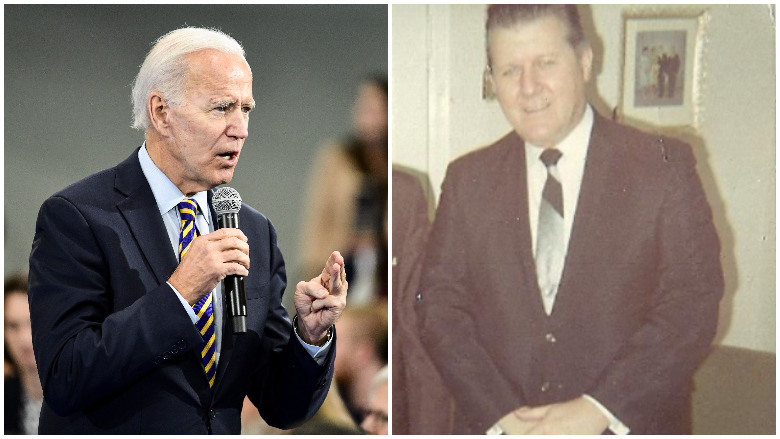
Getty/Facebook Joe Biden and Frank Sheeran
Joe Biden’s surprise upset that first put him in the U.S. Senate in 1972 had a boost from a union-organized strike designed, in part, to stop his Republican opponent’s campaign ad insert from reaching voters, according to the book chronicling the life and confessions of Frank Sheeran, the union boss with Mafia ties who is the subject of the new Netflix Mafia movie, The Irishman. Sheeran said he helped organize a picket line effort to stop newspaper delivery after a prominent Democratic lawyer he didn’t name asked him to do so to help Biden win.
Newspaper archives document the strike and its effect on Wilmington papers. A December 29, 1972 article in the Hanover, Pennsylvania Evening Sun reported that a “strike by News-Journal Co. drivers halted publication of the Morning News and Evening Journal for a couple days prior to the election.” The strike ended in “the latter part of November,” the article reported. Biden won the election by a little more than 3,000 votes.
A 1972 newspaper article in the Wilmington Morning News on the strike described how “carrier boys and girls continued to report harassment in their efforts to deliver papers.”
In the book, Sheeran said that some people “say that this maneuver is what got Senator Joe Biden elected. Especially the Republicans say that if those newspaper inserts from the (J. Caleb) Boggs side got delivered inside the newspapers it would have made Joe Biden look very bad.”
Considering the geography, perhaps it’s inevitable that Frank Sheeran, the protagonist in the new Martin Scorsese movie, would cross paths with Joe Biden.
After all, Sheeran, now deceased, was a union boss in Wilmington, Delaware, the state that was Biden’s home base for years. And Sheeran was tied to Russell Bufalino, the powerful mobster who controlled the Scranton, Pennsylvania area where Biden was born. According to Biography.com, Biden was raised in Scranton until age 13 when his family moved to Mayfield, Delaware. As a young lawyer and councilman, Biden lived in Wilmington.
In fact, although even Sheeran said he wasn’t sure if Biden knew about the scheme, Sheeran does mention the 2020 Democratic presidential candidate several times in his interviews with author Charles Brandt for the book, I Heard You Paint Houses.
Sheeran, of course, also told Brandt that he murdered Teamsters boss Jimmy Hoffa, who disappeared in 1975, and said he committed other gangland murders. Some experts, though, don’t buy the Sheeran confession; indeed, old newspaper articles from the 1970s make it clear the government suspected another group of mobsters, including Salvatore “Sally Bugs” Briguglio, of being the possible Hoffa triggerman. Those accounts accuse a pair of powerful mobsters, Tony Giacalone of Detroit and Tony Pro Provenzano of New Jersey, of orchestrating the probable murder on the order of Bufalino, who ran a powerful Pennsylvania crime family. Hoffa’s disappearance remains unsolved, and his body was never found. Other experts have created doubt about Sheeran’s confession to murdering Crazy Joe Gallo; eyewitness accounts described a gunman who didn’t look like Frank Sheeran.
With all that in mind, here’s what you need to know about the book’s Joe Biden references:
Frank Sheeran Said a Democratic Lawyer Wanted Him to Stop the Newspaper Ads & Described Himself as a Biden Supporter
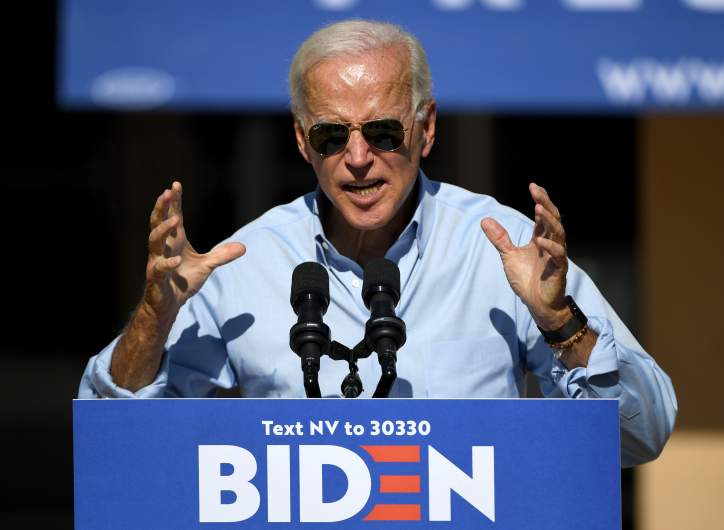
Getty
In the book, Sheeran described how much he enjoyed being president of Local 326. He was even made “Honorary President for Life” while incarcerated. He got the Teamsters branch a new building in 1979. Here’s what he claimed in the book about Joe Biden:
Toward the end of 1972, which was three years before Hoffa would disappear, a “very prominent lawyer” big in the Democratic Party came to talk to Sheeran about the 1972 race for the U.S. Senate in Delaware. He didn’t name the lawyer. The incumbent, a Republican Senator named Caleb Boggs, had wanted to speak to the union members, but Sheeran felt Boggs was against labor.
Boggs’ opponent, Joe Biden, had already asked to speak to the union members. Sheeran said he “took it to the executive board,” and no one said no so he said “sure.”
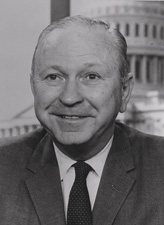
J. Caleb Boggs
At that time, Biden was a County Council member and a Democrat. He was a “young kid” and a “very good talker” who gave a “really good pro-labor speech” to the union rank-and-file. He said “his door would always be open to the Teamsters,” Sheeran told Brandt, saying he was thus “already in Biden’s corner” when the lawyer came calling.
Now the lawyer told Sheeran that Boggs was going to be running advertising inserts claiming Biden had distorted his record. The lawyer “didn’t want those newspapers to be delivered,” said Sheeran, adding, “I told my friend the lawyer and the guy he had with him that they could count on me to get it handled. I always had a lot of respect for that lawyer and I thought Biden was better for labor anyway.”
The book explained that Wilmington was in the more liberal part of the state and, at that time, Delaware was a small state of 600,000 people and half lived in the northern county. Nearly “every newspaper buyer in the state” read the Wilmington newspaper, the book says.
“The ads were going to show what Biden had said about Boggs alongside of Boggs’s actual voting record or whatever,” Sheeran says in the book. Another man present with the lawyer “worked on the paper.” Sheeran told that man “I would hire some people and put them on the picket line for him. They were people nobody would mess with.”
He said that man wanted to put up an informational picket line but didn’t have good people at the newspaper “he could trust to walk the line.” He said he would put up a picket line and “see to it that no truck driver crossed that picket line.” The newspapers were never delivered, the book says. Another union was also involved.
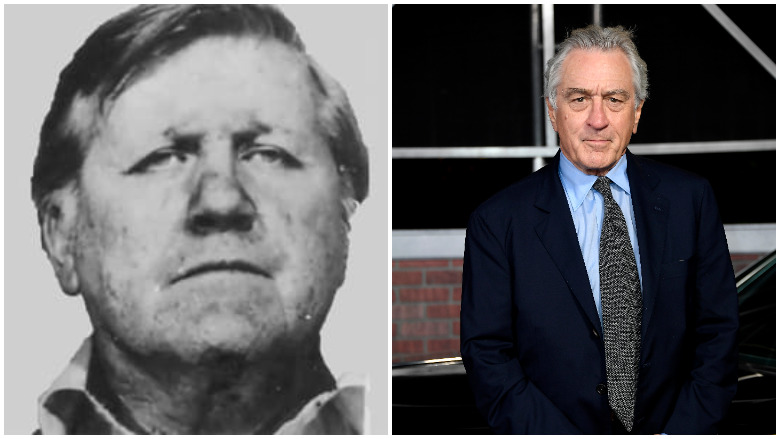
Mugshot/GettyFrank Sheeran and Robert De Niro, who plays him on Netflix.
“The day after the election the information picket line came down and the newspaper went back to normal and Delaware had a new United States Senator,” Sheeran told Brandt.
Sheeran stated in the book that he had no way of knowing if Biden knew “that picket line thing was done on purpose on his behalf” but he said that Biden, as a U.S. Senator (he won the narrow election in a surprise upset) “stuck by his word he gave to the membership. You could reach out for him and he would listen.”
The Boggs’ ads that didn’t reach voters were designed to counteract ads from Biden shortly before in the same newspapers.
Slate.com reports that, a little more than a week before election day in 1972, the readers of the Wilmington newspapers were “greeted with a series of advertisements” from Biden that were “meant to highlight how Boggs, and his generation, were out of touch.”
One ad said that “Cale Boggs’ generation dreamed of conquering polio. Joe Biden’s generation dreams of conquering heroin.” Another said, “To Cale Boggs, an unfair tax was the 1948 poll tax. To Joe Biden, an unfair tax is the 1972 income tax.”
The article explains how Biden had other things going for him that election, including a desire by voters for change and youth and Boggs’ reluctance to run again. However, even Biden didn’t think he was going to win, telling the Morning News, “If I were a bookie, I’d give five-to-one odds right now that Boggs will be reelected.” Slate describes how Boggs was a beloved political figure, undefeated, and had enjoyed Labor’s support in the past.
In 2019, Roll Call described how Biden’s 1972 Senate run was a “long-shot challenge.” Biden was only 29 years old then and running against Boggs, “one of the most popular politicians in Delaware history.”
The election was considered “one of the biggest electoral upsets in Senate history,” Roll Call reported. Of course, Biden’s life was soon punctured by tragedy when his wife and young daughter were killed in a car crash that also injured his two sons, Beau and Hunter. That happened just a month after he won the election.
Ted Kaufman, a Biden friend and aide, told Roll Call: “I have never seen a single one that can compare to the Biden ’72 campaign in terms of the size of the upset.”
Roll Call explains how, indeed Boggs was planning a campaign insert in the Wilmington News Journal, but the “newspaper was hit with a labor strike, and the state GOP had to deliver the fliers by hand.” Biden won 50 to 49 percent, according to Roll Call.
The Wilmington, Delaware Morning News, in an article dated on November 9, 1972, a Thursday, described how “striking drivers at the News-Journal Co. yesterday began a handbill campaign to mount a public boycott of The Morning News and Evening Journal.”
The strike was entering its seventh day at that point, and the company said the losses were “substantial.” That article ran two days after the November 7, 1972 election.
The company said the “problems of putting out papers Monday (the day before the election) and subsequent election and postelection editions made it impossible to estimate the loss accurately.”
The newspaper added that “threats against members of the International Typographical Union were reported yesterday, and carrier boys and girls continued to report harassment in their efforts to deliver papers.”
A company spokesman said some district circulation mangers who were also Guild members “apparently continued to request carriers under their jurisdiction not to deliver papers.”
Biden Has Enjoyed Support From Organized Labor
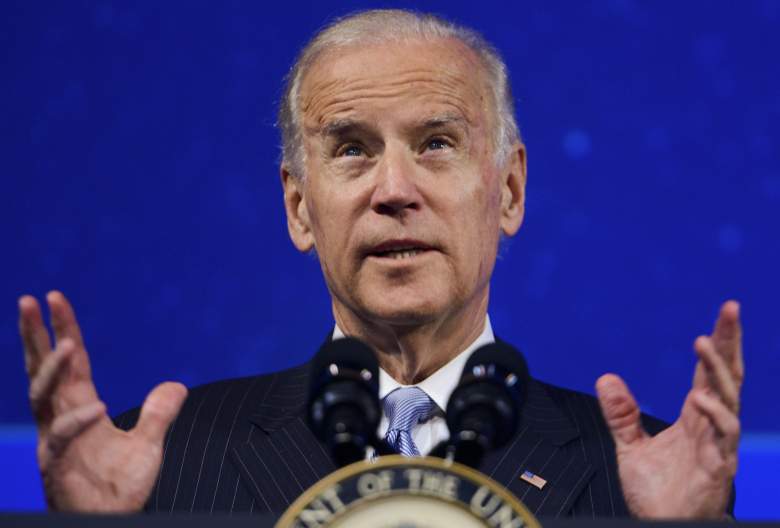
Getty
Old articles on the Teamsters website make it clear that union support for Biden has continued throughout the years.
The Teamsters website says, “Vice President Joe Biden credits organized labor with helping him win a U.S. Senate seat and the vice presidency. Now he’s looking for Teamster support to return him and President Barack Obama to the White House in 2012.” And, in 2011: “Security will be tight on Day Five of the 28th International Brotherhood of Teamsters Convention as Vice President Biden caps off an exciting five days in Las Vegas.”
According to the National Right to Work Committee, Biden “kicked off his 2020 campaign at a union hall owned by Teamsters Local.”
“I make no apologies; I am a union man, period,” Biden said, according to that site.
An article on the Teamsters website says, “Biden is one speaker who resonated with Teamsters at our last Convention. Back then he was a senator from Delaware, where he was a key ally for organized labor. As vice president of the United States, he still has a strong rapport with people in the labor movement. And he’s an ardent supporter of passenger rail and Amtrak.”
Sheeran Was Taken Down in a Racketeering Case Eventually
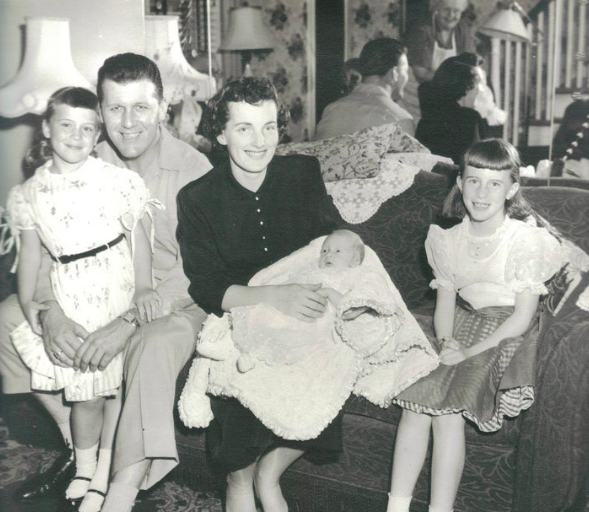
Pictured: Frank Sheeran and his first wife, Mary, along with their three daughters: Peggy, Dolores, and MaryAnne.
The government eventually got their man, Frank Sheeran. But it took a while, and he died a free man.
An Associated Press story from February 22, 1980 explained how prosecutors had demanded a conviction for Sheeran in a federal racketeering trial. The defense claimed Sheeran was indicted “because he drove around Russell Bufalino whom the United States claims is a gangster.”
The main witness was an informant and former hitman, Charles Allen. At that time, Sheeran was described as 59, “grey-haired,” living in Philadelphia and president of Teamsters Local 326 in Wilmington, Delaware. The article says Sheeran testified that he knew Russell Bufalino, described by authorities as “an organized crime chieftain in northeastern Pennsylvania, for over 25 years.” By this point, Bufalino was in federal prison. The charges against Sheeran included the slaying of a Wilmington Teamster named Frederick J. Gawronski.
According to a 1980 article in the Wilmington News Journal, Allen taped 50 conversations with Sheeran in the late 1970s, claiming Sheeran “paid him for two murders, three attempted murders, and two arsons.”
The government alleged that Sheeran “works for Russell Bufalino,” the story reported. Sheeran, the article said, indicated the government had offered him “all kinds of deals” to provide information on what happened to Hoffa. A 1979 article in the same newspaper described Sheeran as having “always an implied threat in his personality, the way he carries himself, the language he uses.”
There were two racketeering cases, though. In the first one, Sheeran was acquitted by a jury that didn’t believe the informant. In the second, he was convicted in a labor-racketeering case in Wilmington. In the latter case, he was accused of a scheme that “cheated drivers out of wages, seniority and benefits.” The government alleged that Sheeran took bribes in the form of free use of “luxury cars,” according to a 1981 News Journal article.
READ NEXT: The Real Story of Frank Sheeran.